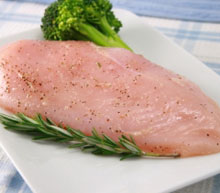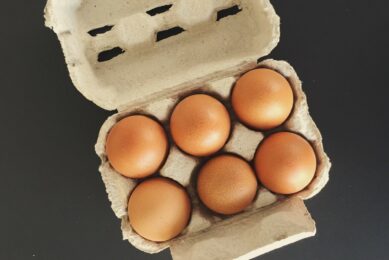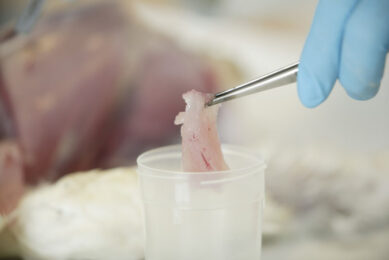Chicken producers debate ‘natural’ label for injected poultry

A disagreement among poultry producers in the United States about whether chicken injected with salt, water and other ingredients can be promoted as “natural” has prompted federal officials to consider changing labelling guidelines.
The U.S. Department of Agriculture (USDA) had maintained that if chicken wasn’t flavoured artificially or preserved with chemicals, it could carry the word “natural” on the package.
But the agency agreed to take another look at its policy after some producers, politicians and health advocates noted that about one-third of chicken sold in the U.S. was injected with additives that could represent up to 15 per cent of the meat’s weight, doubling or tripling its sodium content. Some argue that could mislead or potentially harm consumers who must limit their salt intake.
The USDA’s Food Safety and Inspection Service plans to issue new proposed rules this fall. Perdue, the nation’s third largest poultry producer, is among those pushing for a change. The company has joined a group called the Truthful Labeling Coalition, which has hired a lobbyist and launched an advertising campaign.
“Our labels say natural or all natural only if there is nothing added,” Perdue spokesman Luis Luna said. “Under no circumstances is it acceptable to label poultry that has been enhanced with water or broth or solutions as natural, or all natural.” Such mixtures are injected into poultry to make the meat tastier and more tender. The two largest chicken processors, Pilgrim’s Pride and Tyson Foods, are among those that affix “natural” labels to chicken injected with extra salt and water. Industry experts said the practice has become more common in the past decade.
Tyson spokesman Gary Mickelson said the company sponsored a national study that found most consumer didn’t mind those labels if the ingredients added were deemed natural.
Gary Rhodes, a spokesman for Pilgrim’s Pride, said the company simply wanted to offer its customers a choice.
“We offer both 100 per cent natural enhanced and non-enhanced fresh chicken,” Rhodes said. “It really depends on what the customer wants. It’s all about choice.”
But Bill Mattos, president of the California Poultry Federation, argued that current labelling rules leave consumers confused. He said the industry needs to work harder at being clear about its products.
“With all the talk about food now, all the interest in salt, the chicken industry needs to be very upfront about these issues, and be very truthful,” said Mattos.
California Senator Barbara Boxer weighed in on the issue earlier this year, calling in a press conference for the USDA to “immediately prevent sodium injected chicken from using the ‘natural’ label and require all poultry producers to identify added ingredients in print large enough to ensure that consumers can make informed choices.”
The issue is worrisome because Americans generally eat far too much salt, with serious health consequences, said Kirsten Bibbins-Domingo, a researcher at the University of California, San Francisco.
Her research, published this year in the New England Journal of Medicine, found that regulations aimed at cutting back Americans’ sodium intake could save US$10 billion to US$24 billion in health care costs, and thousands of lives, every year.
Government intervention is needed, Bibbins-Domingo said, because much of the salt people eat comes in prepared food, not out of a salt shaker. “We have to educate people to read labels and make better choices,” she said. “When there are foods that people consider to be fresh and without additives, and they also have salt added, you feel you are almost fighting a losing battle.”
In a report issued this year, the Dietary Guidelines Advisory Committee, which advises the federal government, revised the recommended daily salt intake from a teaspoon a day to about two-thirds of a teaspoon. It pointed to meat with added salt as a particular problem.
Foster Farms, based in Livingston, Calif., has been at the forefront of the campaign to change labelling rules.
The company sells marinated products that have added salt – but it is clear to consumers, said company spokesman Ira Brill. The problem with injection is the customer can’t tell what’s in their chicken.
“One of the issues we face as a nation is how to eat healthy,” Brill said. “To the degree you like salt, you should be able to add it. But you should be able to make that decision for yourself. “













